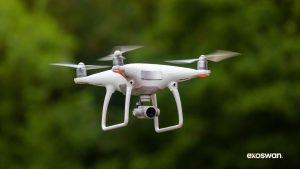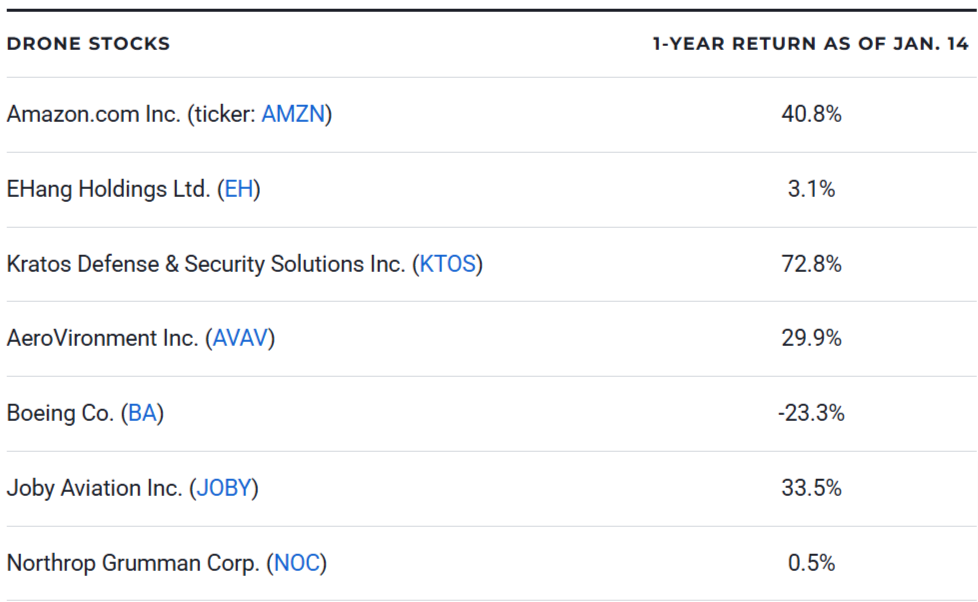The U.S. drone stock market is experiencing significant growth and interest, driven by advancements in technology and increasing applications across various sectors.
Market Overview
Growth and Revenue: The global commercial drone industry is valued at $30 billion in 2024, with an expected annual compound growth rate of 10.6% from 2025 to 2030, according to Grand View Research. Despite regulatory challenges, the industry is seeing substantial revenue gains in sectors like defense and medicine.
Regulatory Environment: While regulatory obstacles remain a concern, the Federal Aviation Administration (FAA) in the U.S. is accelerating efforts to clear commercial drones for operation, unlike other countries where approvals can take months.
Funding: There has been a slow leak in funding, with a 50% decline in industry funding from 2022 to 2023 (from $3.46 billion to $1.67 billion year over year).
However, the U.S. drone stock market is dynamic, with tremendous growth potential and a variety of investment opportunities. Investors should consider both established companies and emerging technologies to capitalize on this growing industry.

Which companies are taking the lead in the fast-moving drone industry right now, and what are their profit prospects in the new year? These leading lights could accelerate share prices well into 2025 and beyond:

Amazon.com Inc. (AMZN)
This e-commerce giant is mounting an impressive array of drone technologies to deliver packages from warehouses to consumer front doors. In November, Amazon unveiled its new MK30 advanced delivery drone in testing flights in Phoenix and College Station, Texas. The drones can fly two times farther than current company UAVs, and they can fly much quieter, too. In real-world terms, Amazon describes an order coming to its Tolleson, Arizona, fulfillment center that can be delivered within 60 minutes to regional customers.
The FAA approved the new MK30 drones in early November, giving Amazon even more momentum on its decades-long mission to get its products on drones and in the hands of its customers. Amazon is also gearing up its European drone delivery service with successful MK30 drone deliveries tested in San Salvo, Italy, in December. Globally, Amazon expects the MK30 airborne vehicle to reach 500 million customers annually. Amazon is currently trading around $218 per share, down 0.7% year to date as of Jan. 14 but up 40.8% over the past year.
EHang Holdings Ltd. (EH)
This Guangzhou, China-based aerial vehicle technology platform company operates primarily in Asia, South America and Europe and, at 11 years old, is one of the newer drone companies on the rise in 2025. The company has struggled to get a financial foothold, and the company’s stock price was down 6.3% in 2024. That trend is still in place in early 2024, with EH’s share price down 5% in the new year. Company financial performance is also mixed, with EHang recording 0% earnings growth last quarter, although sales growth clocked in at 356%.
An analysis by nine sector analysts points to upward growth for EH, with a one-year target price of $22.30, representing a 49% boost from its current share price of $15. In early January, Goldman Sachs popped a “buy” rating on EH stock, lending more credibility to the company’s continuing efforts to sell its flagship EH216-S autonomous passenger drone. The company delivered 63 units in the third quarter of 2024, compared to five units in the second quarter of 2023. The company says it expects stronger demand for its EH216-S drone in 2025.
Kratos Defense & Security Solutions Inc. (KTOS)
Kratos is off to a cracking start in 2025, with its share price up 24.2% so far in 2025 and up 72.8% over the past year.
The company is expected to prosper with the incoming Republican-leaning Congress and President-elect Donald Trump on his way to the White House on Jan. 20. Team Trump has indicated it will favor a larger defense budget and companies that excel in unmanned aircraft and hypersonic technology. Budget money is expected to pour into emerging military drone technologies.
Already in the works is Kratos’ new five-year pact inked with the U.S. Defense Department for $1.45 billion, representing the most significant contract in the company’s history. The contract covers work Kratos will provide in the Multi-Service Advanced Capability Hypersonic Test Bed, or MACH-TB, program, which is now prioritized by the Office of the Under Secretary of Defense for Research and Engineering Test Resource Management Center.
A recent “buy” call has been issued by 69% of sector analysts covering KTOS.
AeroVironment Inc. (AVAV)
With a share price of $164.65 as of Jan. 14, this Arlington, Virginia-based drone and missile manufacturer is up 7% year to date and 29.9% over the past year.
The stock picked up steam late this summer after an announced $990 million deal with the U.S. Army involving the company’s Switchblade guided bomb technology. Uncle Sam had suspended that deal after other defense companies protested it, but the Army fully approved the contract in late September. On Dec. 16, the U.S. Government Accountability Office officially denied the protest, initially filed by privately held Mistral. AVAV stock rose 7.1% immediately on the news. In January, AVAV announced it had received its second order, worth $55.3 million, for its Switchblade loitering munition systems, which is earmarked for the U.S. Army’s Directed Requirement for Lethal Unmanned Systems.
Similar to KTOS, drone industry analysts are on board with AVAV, with 90% recommending a “buy” on AVAV shares and a one-year price target of $231. That represents the potential for 40.3% upside.
Boeing Co. (BA)
Boeing shares are down 5.6% year to date but are up 12.1% over the past three months as of Jan. 14. One ongoing problem with Boeing is operational, as the company delivered only 17 of its linchpin 737 Max jets in December, down from its 2024 average of 22 per month. On the upside, the forward-looking view is more bullish, with FactSet estimating 409 Max Jet deliveries in 2025, or approximately 34 per month.
Plus, the aircraft manufacturing giant is bouncing back in other key areas. The Japanese Ministry of Defense recently contracted with Boeing to test aerial drones for Japan’s emerging unmanned combat aircraft program. Boeing is also rolling out plans to expand production of its MQ-25 Stingray, an unmanned aerial refueling aircraft designed for the U.S. Navy, with proposals underway and contracts expected later in 2025. The company also has a $500 million order backlog that, as long as all obligations are met, should lift the company’s financial fortunes.
A slew of Wall Street analysts are backing BA stock, with Barclays sticking by its “buy” call on Boeing shares with a target price of $210 per share. Following suit in mid-January were UBS, with a $208 target share price, and RBC Capital, with a $200 price target.
Joby Aviation Inc. (JOBY)
This Santa Cruz, California, company develops all-electric vertical take-off and landing aircraft (eVTOL) for commercial passengers. Company shares are down 3.3% year to date but are up 33.5% over the past year. One reason for the stock underperformance lately is recent insider stock sales from company management, which included 250,000 shares sold by company CEO Joeben Bevirt on Jan. 6. Company insiders sell shares for a variety of reasons, and Bevirt still owns over 32 million shares of JOBY, but the recent share-price dip likely concerned enough shareholders to trigger a mild sell-off in early January.
Yet, the underlying reasons for holding JOBY stock remain. The company expects to finally start generating revenue in 2025. Last October, the company’s airborne vehicle fleet was approved for takeoff by the FAA, and Joby also has $900 million in reserve cash, which allows it to build more eVTOL aircraft on a tighter schedule. The company also recently announced an exclusive deal with Dubai that gives Joby air taxi rights for six years starting in 2025.
Joby received some analyst support this past week, as Needham held its “buy” call on the stock with a $10 price target, and on Jan. 8, Canaccord raised its JOBY target price to $11.50. JOBY shares closed at $7.86 on Jan. 14. So, it’s a rough patch for Joby in January, but the flight path looks clear for the rest of 2025.
Northrop Grumman Corp. (NOC)
With a share price around $476 in mid-January, this Falls Church, Virginia, advanced aircraft developer has seen its shares moderate as of late. NOC shares are up 1.3% year to date but down 10.6% over the past three months. The company continues to offer a dividend yield of 1.7%, which should help Grumman buy some time as it looks to rebound in 2025.
The company has some upside for multiple reasons, according to Truist Financial analyst Michael Ciarmoli. In his January “buy” call on NOC stock, Ciarmoli cites an opportunistic entry point after NOC’s recent slide, thanks to rising demand for a defense arsenal by a military-friendly Congress and increasing interest in the company’s new B-21 Raider sixth-generation aircraft and Sentinel GBSD high-tech integrated weapon system. Wells Fargo agrees with that sentiment, issuing a Jan. 8 “buy” call on NOC with a price target of $595. That represents 25.1% upside from its current share price.